“Ralph said last night that I cared—for the money.”
She would not tell him of the other things that Ralph had said. And even as she thought of him, across the path of her rapture fell the shadow of Ralph’s scorn of Derry.
He bent down to her. “Jean, if I had been that shabby boy that you first saw in the shop would you have been happy with me, in a plain little house? Would you?”
Up the streets came the people from the churches—the crowds of people who had thanked the Lord soberly, feeling meantime a bit bewildered as to the workings of His Providence. Most of them were going home to somewhat modified feasts. Many of them were having a soldier or two to dine with them. And presently these soldiers whom they feasted would be crossing the sea to that dread land of death and desolation.
Should they thank the Lord for that?
Some of the clergymen, craving light, had sought it in the Old Testament. But one, more inspired than the rest, had found it in the New.
“And there was war in Heaven; Michael and his angels fought against the dragon; and the dragon fought and his angels. And prevailed not—neither was their place found any more in Heaven.”
Those who came from that church spoke of a Holy War, and were thankful that there were men in America going forth to fight the Dragon.
The two soldiers who were to dine at Dr. McKenzie’s were plain young fellows from an upper county in Maryland. They were waiting somewhat awkwardly in the drawing-room when Jean arrived. She took them at once to the less formal library, left Derry with them and went upstairs to dress.
As she came into the fresh and frilly room so identified with her child life and her girl life, she stopped on the threshold.
Oh, little room, little room, the child that once lived here will never come again!
She knelt beside the bed, her face buried in her hands. No words came, but in her heart she was saying, “My beloved is mine—and I am his—”
When she went down, Dr. McKenzie was there, and Emily, and the two young soldiers had lost their awkwardness. When they found out afterwards that the young Drake who talked to them so simply and unaffectedly was DeRhymer Drake, the multi-millionaire, they refused to believe it. “He was a mighty nice chap. He didn’t put on a bit of side, and the dinner was some feast.”
And how could they know that Derry was envying them their cavalry yellow and their olive drab?
As for Jean, throughout the afternoon they gazed upon her as upon an enchanting vision. When they told her “Good-bye” it was the boldest who asked, with a flush on his hard cheek, if he might have a bit of the heather which she wore. “I am Scotch myself, and my mother was, and it would seem a sort of mascot.”
If she hesitated for a moment it was only Derry who noticed it. And he helped her out. “It will be a proud day for the heather.”




